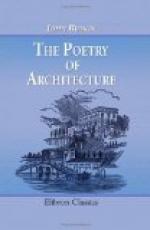97. Man, the peasant, is a being of more marked national character, than man, the educated and refined. For nationality is founded, in a great degree, on prejudices and feelings inculcated and aroused in youth, which grow inveterate in the mind as long as its views are confined to the place of its birth; its ideas molded by the customs of its country, and its conversation limited to a circle composed of individuals of habits and feelings like its own; but which are gradually softened down, and eradicated, when the mind is led into general views of things, when it is guided by reflection instead of habit, and has begun to lay aside opinions contracted under the influence of association and prepossession, substituting in their room philosophical deductions from the calm contemplation of the various tempers, and thoughts, and customs, of mankind. The love of its country will remain with undiminished strength in the cultivated mind, but the national modes of thinking will vanish from the disciplined intellect.
98. Now as it is only by these mannerisms of thought that architecture is affected, we shall find that, the more polished the mind of its designer, the less national will be the building; for its architect will be led away by a search after a model of ideal beauty, and will not be involuntarily guided by deep-rooted feelings, governing irresistibly his heart and hand. He will therefore be in perpetual danger of forgetting the necessary unison of scene and climate, and, following up the chase of the ideal, will neglect the beauty of the natural; an error which he could not commit, were he less general in his views, for then the prejudices to which he would be subject, would be as truly in unison with the objects which created them, as answering notes with the chords which awaken them. We must not, therefore, be surprised, if buildings bearing impress of the exercise of fine thought and high talent in their design, should yet offend us by perpetual discords with scene and climate; and if, therefore, we sometimes derive less instruction, and less pleasure from the columnar portico of the Palace, than from the latched door of the Cottage.
99. Again: man, in his hours of relaxation, when he is engaged in the pursuit of mere pleasure, is less national than when he is under the influence of any of the more violent feelings which agitate everyday life. The reason of this may at first appear somewhat obscure, but it will become evident, on a little reflection. Aristotle’s definition of pleasure, perhaps the best ever given, is “an agitation, and settling of the spirit into its own proper nature;” similar, by the by, to the giving of liberty of motion to the molecules of a mineral, followed by their crystallization, into their own proper form. Now this “proper nature,” [Greek: hyparchousan physin], is not the acquired national habit, but the common and universal constitution of the human soul. This constitution is kept under by the feelings which prompt to action, for those feelings depend upon parts of character, or of prejudice, which are peculiar to individuals or to nations; and the pleasure which all men seek is a kind of partial casting away of these more active feelings, to return to the calm and unchanging constitution of mind which is the same in all.




